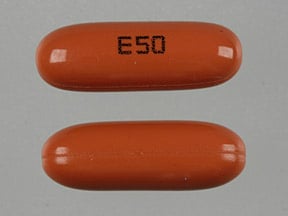
Etoposide Coupons & Savings Card – Discount Prices from $1721.60
Etoposide is a medication used to treat small cell lung cancer, often in combination with other chemotherapy drugs. It is taken orally, typically over a few days during each chemotherapy cycle. Etoposide works by inhibiting an enzyme called topoisomerase II, which is crucial for cell division, thereby preventing the cancer cells from growing by damaging their genetic material. This medication may increase the risk of infections and bleeding, so it is important to discuss its use with your healthcare provider to ensure it is safe and appropriate for your condition.
Our coupons are free to use. Before paying, show the pharmacist your Etoposide savings card to get your free discount. Use our filters below to edit the prescription box to match your needs. The Etoposide prices will update based on your prescription needs. Above our Etoposide coupons, you can change your location to see pharmacy prices and costs in other areas. We're here to help you buy Etoposide at the lowest price with our prescription discount card.
My prescription
Edit
50MG, Etoposide (20 Capsules)
Select pharmacy

CVS
$1721.60
COUPON PRICE
Walgreens
$1788.84
COUPON PRICE
Albertsons
$1793.89
COUPON PRICE
Walmart
$1804.28
COUPON PRICEEtoposide savings card
Show this card to your pharmacist
CVS
$1721.60
BIN
ID
PCN
GRP
019876
LHA0C79BAC
CHIPPO
LHX
Powered by
Etoposide is a medication used to treat small cell lung cancer, often in combination with other chemotherapy drugs. It is taken orally, typically over a few days during each chemotherapy cycle. Etoposide works by inhibiting an enzyme called topoisomerase II, which is crucial for cell division, thereby preventing the cancer cells from growing by damaging their genetic material. This medication may increase the risk of infections and bleeding, so it is important to discuss its use with your healthcare provider to ensure it is safe and appropriate for your condition.
Our coupons are free to use. Before paying, show the pharmacist your Etoposide savings card to get your free discount. Use our filters below to edit the prescription box to match your needs. The Etoposide prices will update based on your prescription needs. Above our Etoposide coupons, you can change your location to see pharmacy prices and costs in other areas. We're here to help you buy Etoposide at the lowest price with our prescription discount card.
Etoposide dosage forms
Use our Etoposide 50MG coupon with prices from $1721.60 for 20 Capsules. You can also use our Etoposide 50MG coupon with prices from $81.84 for 1 Capsule.
Dosage Quantity Price from Per unit 50MG 20 Capsules $1721.60 $86.08 50MG 1 Capsule $81.84 $81.84
| Dosage | Quantity | Price from | Per unit |
|---|---|---|---|
| 50MG | 20 Capsules | $1721.60 | $86.08 |
| 50MG | 1 Capsule | $81.84 | $81.84 |
